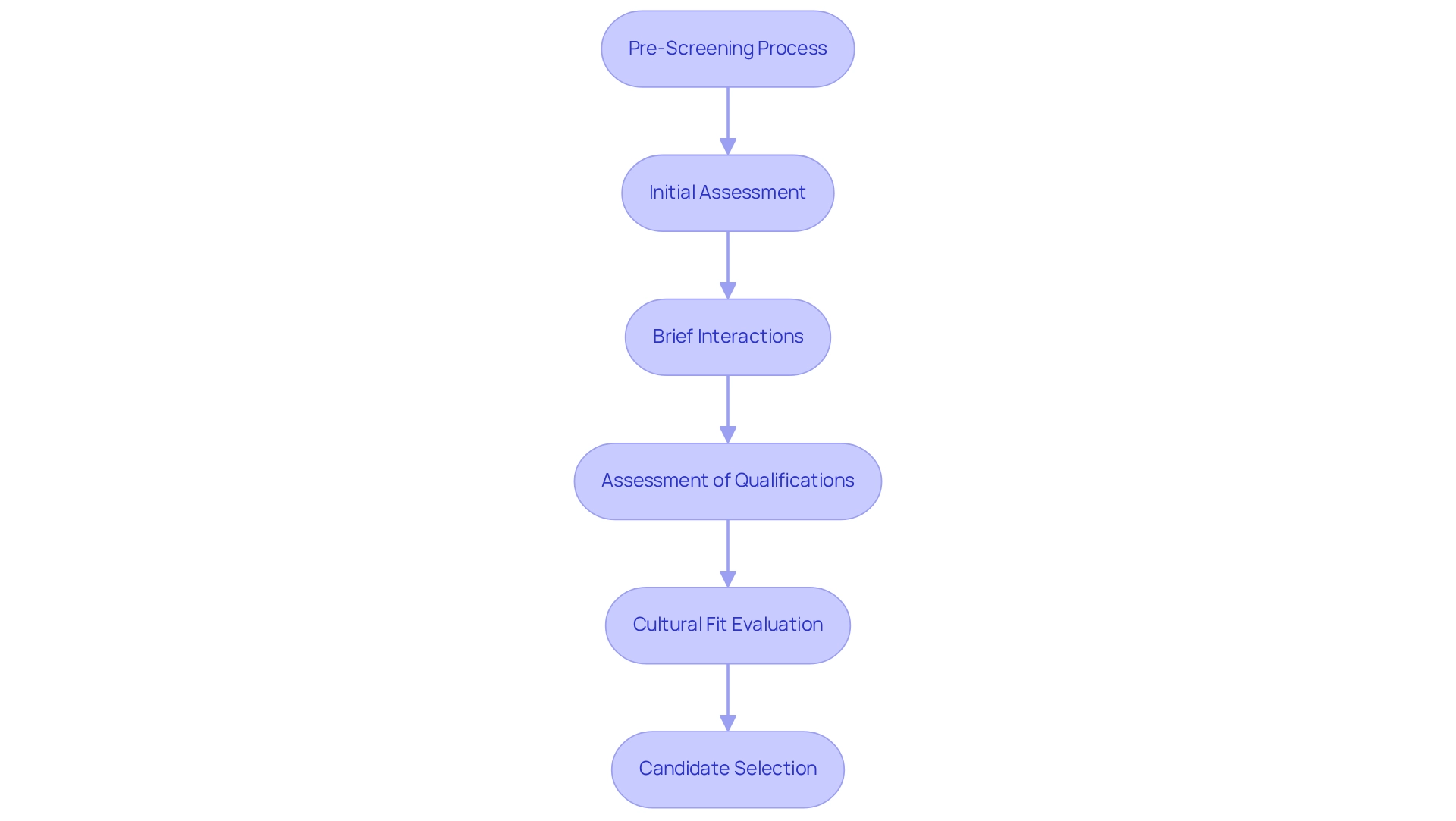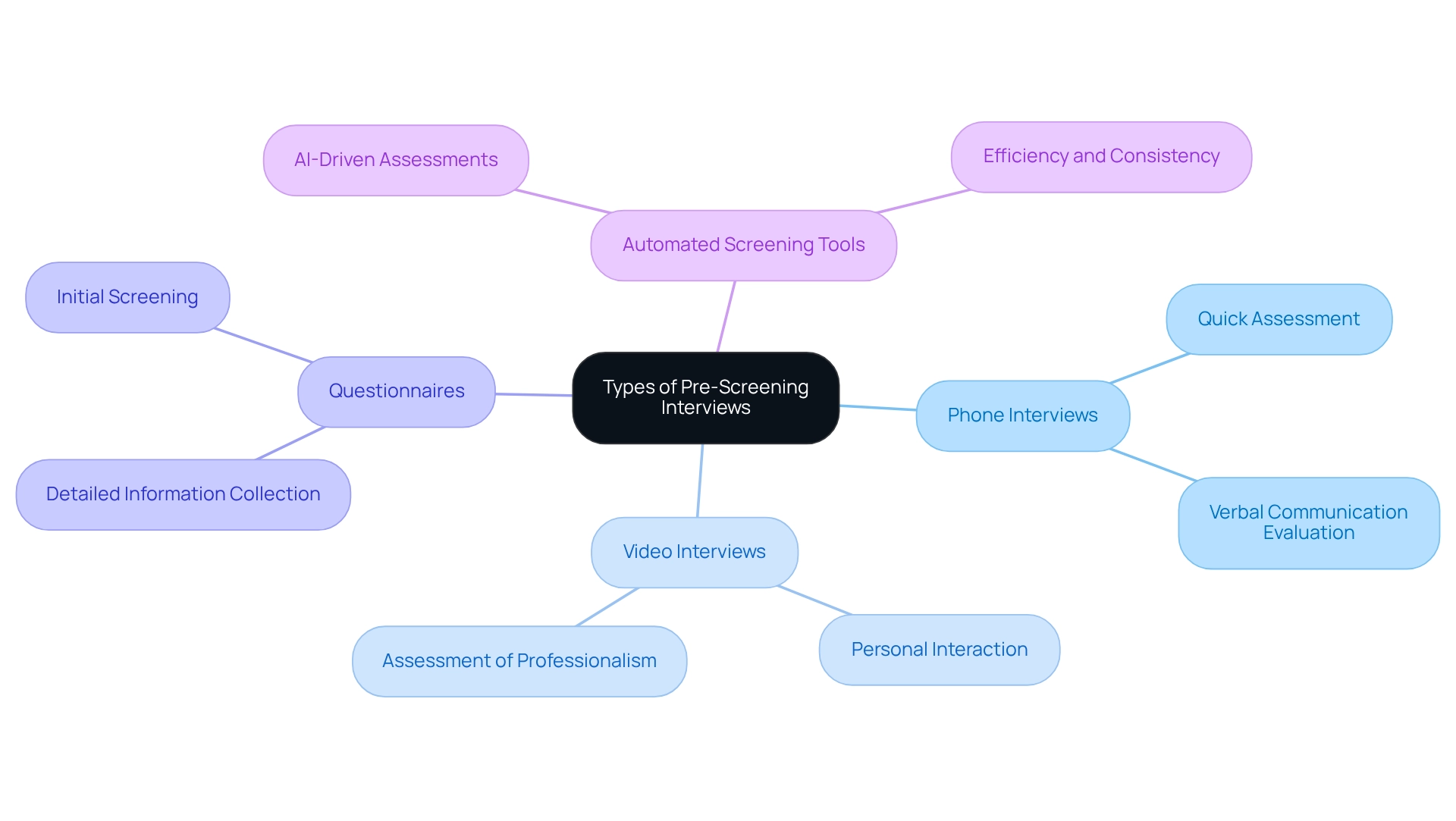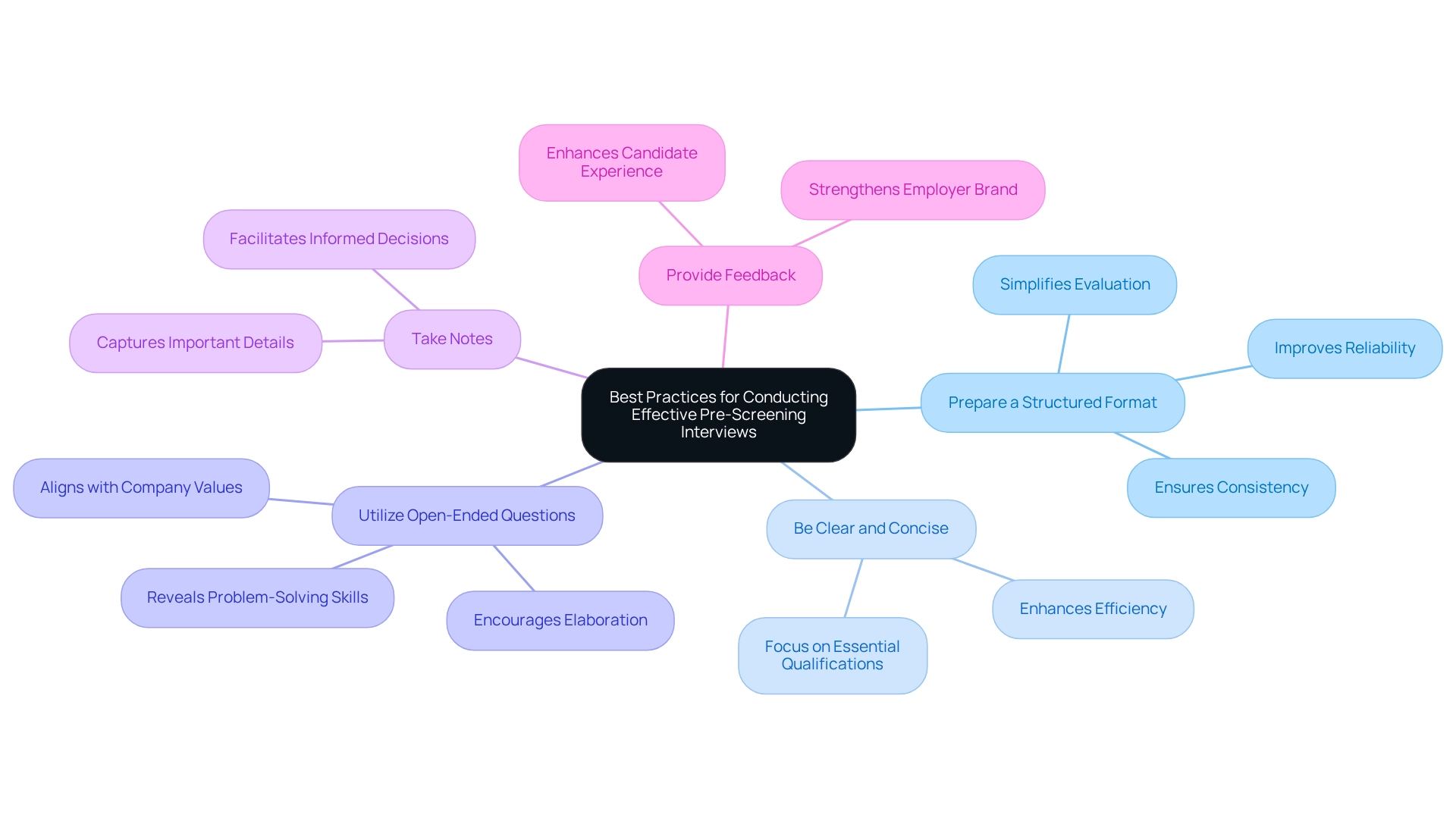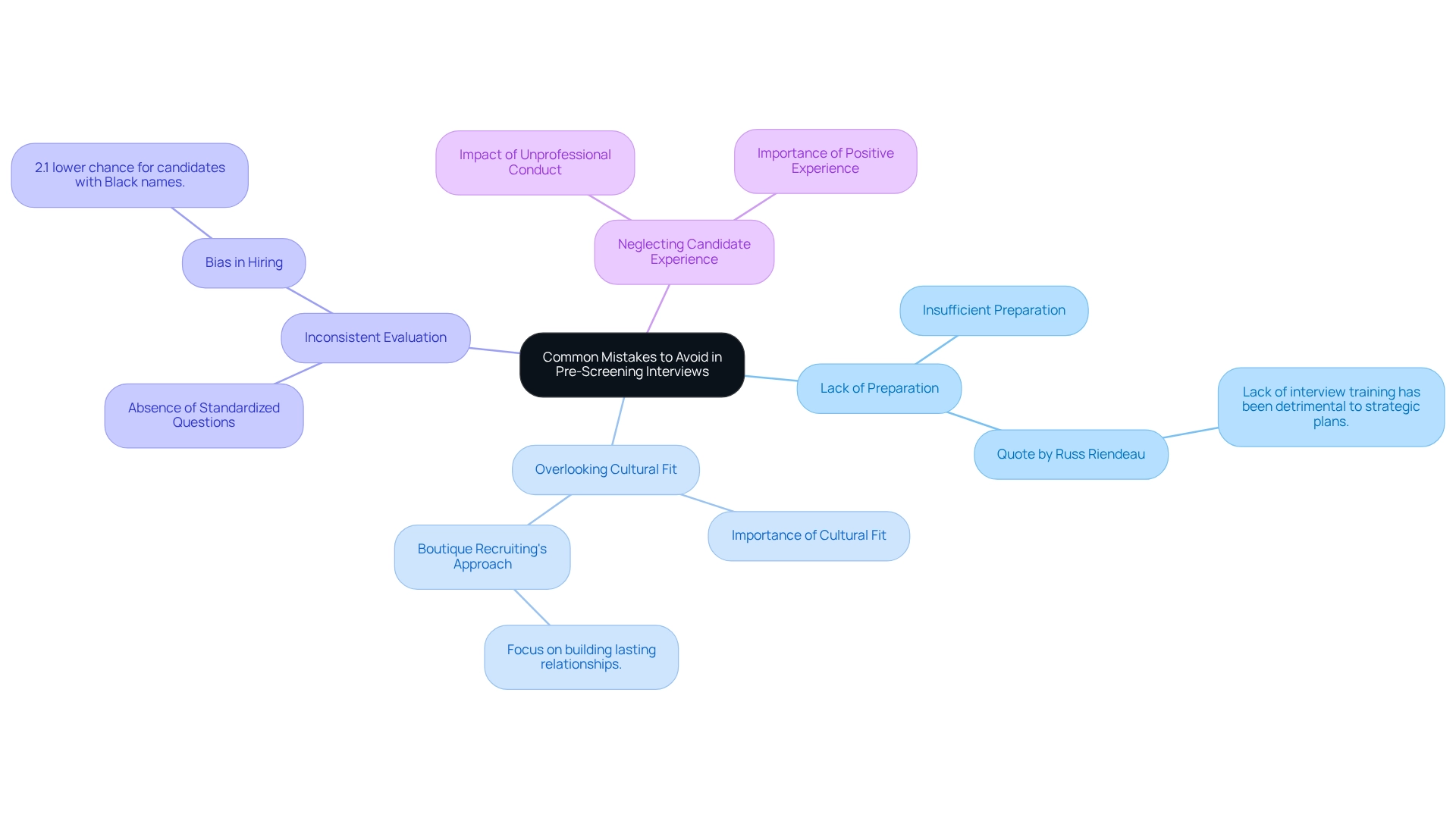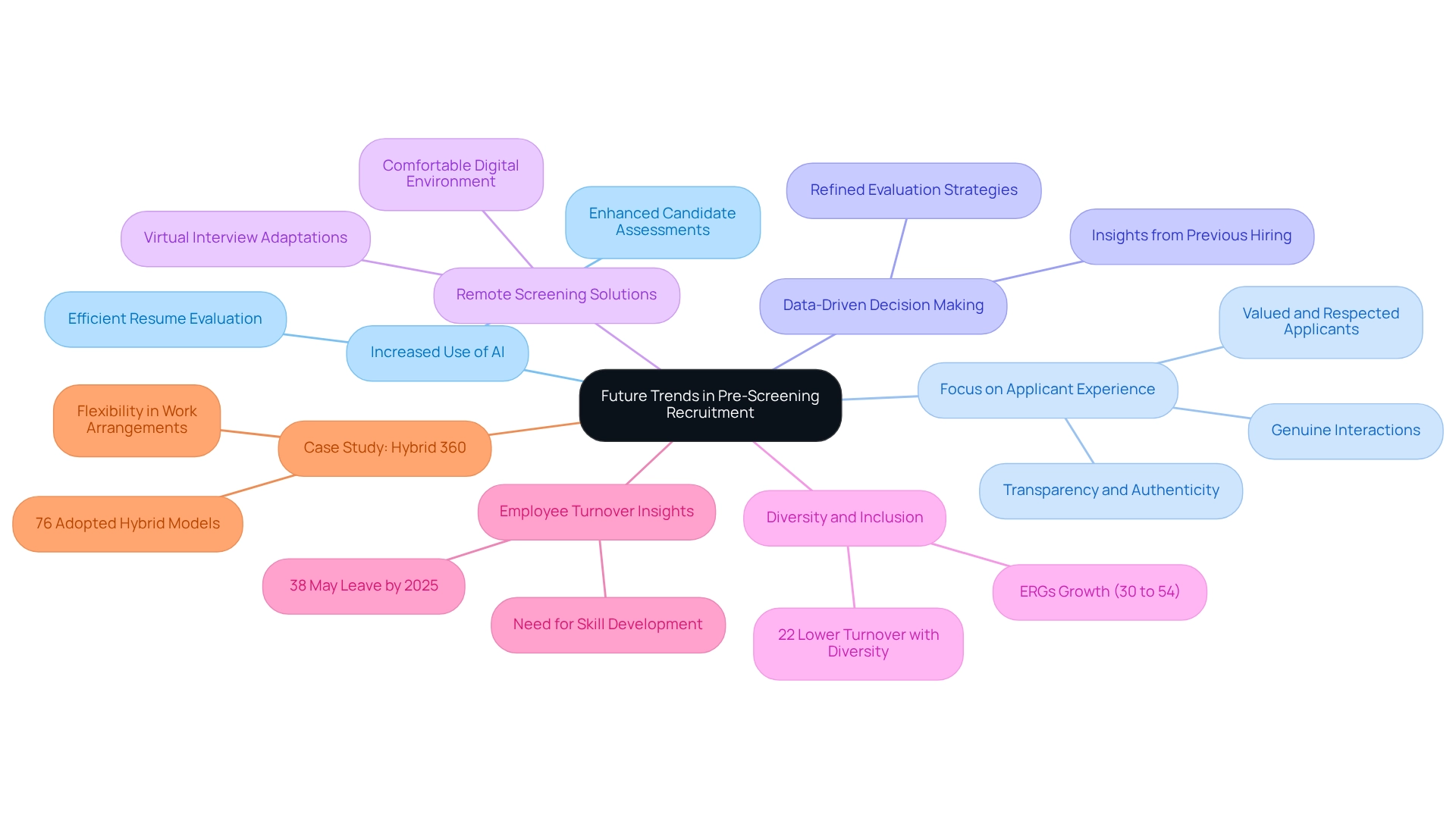Overview
Pre-screening stands as a pivotal initial assessment in recruitment, filtering out unqualified candidates and thus streamlining the hiring process while enhancing the quality of hires.
Effective pre-screening methods, including:
- Structured interviews
- Advanced technology
not only conserve time and resources but also elevate the candidate experience. This, in turn, contributes to higher retention rates and bolsters employer branding.
In an industry where every hire counts, the implementation of such strategies is not merely beneficial; it is essential for success.
Key Highlights:
- Pre-screening is an initial assessment to filter out unqualified candidates, streamlining the hiring process.
- Initial evaluations save time and resources for recruiters and improve the quality of hires in a competitive job market.
- Common pre-screening methods include phone interviews, video interviews, questionnaires, and automated screening tools.
- Effective pre-screening enhances candidate experience, leading to higher retention rates and improved employer branding.
- Best practices for pre-screening include structured interviews, clear communication, open-ended questions, and providing feedback.
- Common mistakes in pre-screening involve lack of preparation, neglecting cultural fit, inconsistent evaluations, and poor candidate experience.
- Technological innovations like ATS, AI-powered tools, and video interview platforms enhance the efficiency of the pre-screening process.
- Future trends in pre-screening include increased AI use, focus on applicant experience, data-driven decision-making, and remote screening solutions.
Introduction
In the competitive landscape of recruitment, pre-screening has emerged as an indispensable tool for organizations striving to identify the right talent efficiently. This initial evaluation process not only streamlines hiring but also enhances the quality of candidates who progress to interviews.
As companies grapple with the complexities of a rapidly changing job market, understanding the nuances of pre-screening—from its methods and best practices to the latest technological innovations—becomes paramount.
By leveraging effective pre-screening strategies, organizations can not only save time and resources but also foster a positive candidate experience that ultimately leads to better hiring outcomes.
As the recruitment landscape evolves, so too does the importance of pre-screening in securing top talent for the future.
Understanding Pre-Screening: Definition and Purpose
Pre-screening refers to a vital initial assessment that individuals undergo before being invited for formal interviews. This crucial step is designed to exclude applicants who do not meet the basic qualifications or align with the role’s requirements. The primary objective of initial evaluations is to streamline the hiring process, ultimately conserving time and resources for both recruiters and applicants.
Typically, initial screening involves brief interactions, often conducted through phone or video calls, where recruiters assess applicants’ qualifications, skills, and cultural fit using standardized questions. This method ensures that only the most suitable individuals advance to later phases of recruitment, significantly enhancing overall efficiency.
The importance of initial evaluations cannot be overstated, particularly in a competitive job market where, at the beginning of 2020, there were approximately 7.9 million job openings. Efficient initial assessment methods enable organizations to swiftly identify suitable talent, minimizing the time spent on unqualified candidates and enhancing the quality of hires. As Eric Eddy noted, a firm’s ability to provide outstanding candidates rapidly and effectively underscores the significance of a strong preliminary evaluation.
For instance, a robust preliminary evaluation can lead to improved onboarding experiences, which are essential for the success and long-term retention of new employees. A case study titled “Importance of Onboarding for Retention” highlights that a solid onboarding system is critical for establishing clear expectations and organized training from the outset, ultimately boosting retention rates and accelerating new hires’ productivity.
As we approach 2025, the concept of initial assessment in recruitment continues to evolve, with an increasing emphasis on tailored methods that consider not only technical qualifications but also an individual’s compatibility with the company culture. Amanda, a dedicated recruiter at Boutique Recruiting, exemplifies this personalized recruitment approach. With her expertise in Human Resources and a commitment to fostering connections with applicants, she ensures that the initial evaluation process focuses not only on qualifications but also on understanding individuals’ needs and aspirations.
Amanda’s methodology incorporates behavioral evaluations and situational inquiries that provide deeper insights into individuals’ potential performance and adaptability.
In the current ‘war for talent,’ organizations must adopt proactive recruitment strategies. Amanda’s success in swiftly identifying and engaging top candidates illustrates the necessity of implementing efficient preliminary evaluation methods. Expert opinions emphasize that effective initial screening methods consist of a blend of behavioral evaluations and situational inquiries that offer deeper insights into candidates’ potential performance and adaptability.
In summary, pre-screening serves as an essential component of the hiring process, ensuring that organizations can effectively identify and engage the most suitable candidates while promoting a positive recruitment experience.
The Importance of Pre-Screening in Recruitment
Pre-screening is essential in the recruitment phase, significantly improving the quality of individuals who advance to the interview stage. By effectively filtering out unqualified applicants early, organizations can concentrate their resources on individuals more likely to excel in the role. This strategic method simplifies the hiring procedure and reduces expenses linked to extended recruitment timelines and the risks of making unwise hiring choices.
Moreover, initial screening enhances a favorable applicant experience. It enables candidates to assess their suitability for the role early in the process, fostering a respectful and efficient hiring environment. Research indicates that companies employing strong initial evaluation methods often experience higher retention rates and improved employee satisfaction.
Statistics reveal that 65% of satisfied individuals are likely to interact with a company again, underscoring the significance of a considerate recruitment strategy.
Organizations that have adopted pre-screening methods report significant enhancements in hiring results. For instance, utilizing employee personas as a recruitment strategy has allowed hiring managers to better comprehend applicant preferences, resulting in customized recruitment efforts that align with what job seekers value. This alignment not only improves the quality of applicants but also bolsters the overall recruitment method.
Boutique Recruiting exemplifies this approach, leveraging its strong track record of success to deliver effective hiring solutions that meet the unique needs of both candidates and employers. They perform custom searches tailored to the specific needs of companies across various industries, including technical roles such as Chief Technology Officer, Engineer, and Systems Administrator. Candidates have commended the tailored assistance they received, with testimonials emphasizing how recruiters such as Erika and Debra offered direction and support during the process, ensuring a smooth experience.
As we progress through 2025, the importance of initial evaluations in recruitment continues to rise. With 86% of organizations embracing new virtual technologies for assessments, the recruitment landscape is evolving, making initial evaluations a crucial element for companies aiming to attract and retain top talent. The advantages of pre-screening benefit both applicants and employers, thereby strengthening Boutique Recruiting’s dedication to quality and enhancing the positive experiences of its clients and applicants.
Types of Pre-Screening Interviews: Methods and Techniques
In the recruitment process, what is pre-screening? Pre-screening interviews are essential, offering various methods, each with distinct advantages that cater to different organizational needs. In the ongoing talent competition, where top individuals, including CFOs, Financial Managers, and Chief Technology Officers, are discerning about their job prospects, organizations must showcase themselves effectively during these initial interactions. The most common techniques include:
-
Phone Interviews: A quick and efficient way to assess a candidate’s qualifications and interest in the position. They enable recruiters to evaluate verbal communication abilities and address any preliminary inquiries regarding the individual’s background. Statistics indicate that 20% of applicants who participate in discussions ultimately secure a position, underscoring the importance of pre-screening and its crucial role in enhancing these chances.
-
Video Interviews: This method facilitates a more personal interaction, allowing recruiters to assess an applicant’s communication skills and professionalism in a virtual setting. With the rise of remote work, video assessments have gained popularity, offering a flexible choice that can include applicants from various locations.
-
Questionnaires: Written assessments serve as an initial method to collect detailed information about an applicant’s skills and experiences before a live interview. This approach can simplify the procedure by eliminating individuals who do not meet the essential criteria, ensuring that only the most suitable candidates advance.
-
Automated Screening Tools: Many organizations are now leveraging AI-driven platforms for initial screenings. These tools assess applicant responses and rank them according to predefined criteria, significantly improving efficiency and consistency in the evaluation process.
Each of these methods plays a crucial role in streamlining recruitment while ensuring that applicants are evaluated fairly. As companies adapt to evolving hiring methods, understanding what pre-screening entails and its efficacy as an initial assessment technique is vital. Recent trends reveal that 27% of job applicants receive a job offer after submitting up to 10 applications, emphasizing the competitive nature of the job market and the necessity for effective pre-screening strategies to help candidates distinguish themselves.
Furthermore, crafting a favorable assessment experience is crucial, as individuals who advance to the screening and evaluation stages are more inclined to reapply later. This is supported by the case study titled ‘Impact of Interview Experience on Reapplication,’ which emphasizes that fostering a welcoming environment can enhance a company’s reputation and encourage applicants to consider future opportunities. Applicants are often vigilant for warning signs during the interview process, such as vague job expectations or a lack of engagement from interviewers, which can affect their decision to explore an opportunity further.
Moreover, as Eric Eddy pointed out, Boutique Recruiting’s capacity to provide high-quality applicants swiftly and effectively showcases the success of these preliminary evaluation techniques. This reinforces the significance of not only assessing applicants effectively but also cultivating a welcoming atmosphere that enhances the company’s reputation and illustrates a commitment to quality recruitment.
Best Practices for Conducting Effective Pre-Screening Interviews
To conduct effective pre-screening interviews, recruiters must adhere to several best practices:
-
Prepare a Structured Format: Utilizing a consistent set of questions is crucial for ensuring that all applicants are evaluated against the same criteria. This organized method not only simplifies the evaluation procedure but also improves the dependability of applicant assessments.
-
Be Clear and Concise: Keeping the interview brief and focused on essential qualifications and cultural fit is vital. A well-defined scope enables recruiters to collect relevant information without burdening applicants, enhancing the efficiency of the process.
-
Utilize Open-Ended Questions: Encouraging individuals to elaborate on their experiences and motivations provides deeper insights into their suitability for the role. Open-ended questions foster a discussion that can reveal an applicant’s problem-solving skills and alignment with company values.
-
Take Notes: Recording responses during the interview is crucial for evaluating applicants later. This practice ensures that important details are captured and can be referenced when making hiring decisions, ultimately leading to more informed choices.
-
Provide Feedback: Offering constructive criticism to applicants not only enhances their experience but also strengthens your employer brand. Candidates appreciate insights into their performance, which can encourage them to consider future opportunities with your organization.
In the present talent environment, where the top applicants are discerning and actively evaluating potential employers, applying these best practices is more essential than ever. Recruiters must ensure that hiring managers manage the selection process smoothly, as applicants are attentive to warning signs. By doing so, organizations can significantly enhance what is pre-screening in their assessments.
Organized assessments have been demonstrated to influence applicant evaluation favorably, with 67% of recruiters highlighting the significance of sustaining eye contact to leave a positive impression. As Pleas Andrew Honeywood notes, “Sometimes, an interviewer will talk to a dozen people who have the minimum core baseline skills. So the hiring decision will come down to who the interviewer ‘likes more’ and feels would be a better cultural fit.”
Moreover, a favorable meeting experience can result in heightened applicant interest in upcoming opportunities, as demonstrated by research showing that individuals who advance to the meeting phase are more inclined to reapply. Significantly, one in four job seekers indicated that following compensation, job discussions had the greatest impact on their choice to accept a job offer. Steering clear of typical errors, like not preparing sufficiently or overlooking participants, can further improve the overall efficiency of the initial evaluation.
Common Mistakes to Avoid in Pre-Screening Interviews
Recruiters often encounter significant challenges during discussions about pre-screening, which can severely undermine the effectiveness of the hiring process. Key mistakes include:
- Lack of Preparation: Insufficient preparation, such as failing to formulate targeted questions or thoroughly review the candidate’s background, can lead to unproductive interviews. This lack of preparedness not only impacts the quality of the interaction but also reduces the chances of recognizing the most suitable individuals. As Russ Riendeau, senior partner and chief behavioral scientist, notes, “The lack of interview training for hiring managers in America has been the number-one assassin of great business strategic plans over the past 35 years or more, yet rarely discussed as a critical missing piece.” At Boutique Recruiting, we stress the importance for hiring managers to be well-prepared, as leading prospects are assessing your organization just as much as you are assessing them.
- Overlooking Cultural Fit: A narrow focus on qualifications without considering the individual’s alignment with the organization’s culture can result in poor hiring decisions. Research shows that cultural fit is a vital element in employee retention and satisfaction, making it essential to assess applicants comprehensively. Boutique Recruiting emphasizes this approach by focusing on building lasting relationships and providing personalized service, ensuring that applicants not only meet technical qualifications but also fit well within the organizational environment.
- Inconsistent Evaluation: The absence of a standardized set of questions can lead to biased assessments, where applicants are evaluated on subjective criteria rather than objective qualifications. This inconsistency can distort hiring results and sustain biases, especially towards individuals from diverse backgrounds. For example, research indicates that individuals with Black names have a 2.1% lower likelihood of receiving a job opportunity compared to those with white names, emphasizing the significance of impartial assessment in the recruitment process.
- Neglecting Candidate Experience: Unprofessional conduct or a dismissive demeanor during discussions can damage the organization’s reputation. Candidates who feel undervalued are less likely to accept offers, and negative experiences can deter future applicants. In a competitive talent market, ensuring a positive applicant experience is vital for attracting and retaining top talent.
By understanding pre-screening and identifying these frequent errors, recruiters can significantly enhance the quality of their initial interviews. This proactive method not only improves the selection system but also fosters a more favorable applicant experience, ultimately leading to better hiring outcomes. Boutique Recruiting is dedicated to providing tailored recruitment solutions for niche legal positions, ensuring that your organization attracts the right talent in today’s competitive landscape.
Leveraging Technology in Pre-Screening: Tools and Innovations
Understanding what pre-screening entails is essential as technology transforms the landscape of initial evaluations. It introduces tools that significantly enhance both efficiency and precision in hiring, particularly for high-demand finance and technology positions. Key innovations include:
- Applicant Tracking Systems (ATS): These systems are vital for managing applications, streamlining the screening process by filtering resumes based on specific keywords and qualifications relevant to finance and technology roles. This automation not only saves time but also ensures that only the most relevant candidates are considered.
- AI-Powered Screening Tools: By leveraging artificial intelligence, these tools analyze applicant responses and assess their suitability for finance and technology positions, drastically accelerating the initial evaluation process. This technology allows recruiters to focus on high-potential candidates, reducing the time-to-hire—a critical factor as 60% of companies reported longer hiring durations in 2024 compared to 44% in 2023.
- Video Interview Platforms: Tools like Zoom and specialized recruitment software facilitate remote initial interviews, enabling recruiters to connect with candidates regardless of geographical constraints. This flexibility is particularly advantageous in today’s global job market, where talent can be sourced from anywhere, especially in the tech sector.
- Assessment Software: Platforms that provide skills assessments or personality tests offer recruiters a more comprehensive evaluation of applicants. This aligns with the growing trend towards skills-based hiring, where 94% of employers believe that skills assessments are more effective at predicting job performance than traditional resumes. This shift not only reduces mis-hires but also conserves significant time and costs in the hiring process, enhancing the efficiency of skills-based recruitment.
By integrating these technologies into their initial evaluation processes, organizations can refine their recruitment strategies, leading to better-informed hiring decisions and ultimately reducing mis-hires. Boutique Recruiting emphasizes the importance of customized recruitment processes, ensuring that each candidate’s unique skills and experiences align with the specific demands of finance and technology roles. As Hakan Ozturk pointed out, generative AI tools provide significant advantages for recruiters, such as streamlining the creation of job descriptions.
As the industry evolves, staying abreast of current technological trends in recruitment will be crucial for HR professionals aiming to attract and retain top talent. Boutique Recruiting’s impressive track record and numerous satisfied clients further solidify its reputation as a trusted recruitment partner in this dynamic environment.
Future Trends in Pre-Screening: What to Expect
The future of pre-screening recruitment at Boutique Recruiting is poised to be influenced by several significant trends:
- Increased Use of AI: The integration of artificial intelligence into pre-screening processes is expected to rise, enhancing the accuracy of candidate assessments. AI tools can evaluate resumes and align applicants with job descriptions more efficiently, simplifying the initial selection stage.
- Focus on Applicant Experience: Organizations are acknowledging the significance of applicant experience during pre-screening. Ensuring that applicants feel valued and respected throughout the recruitment process is becoming a priority, as this can significantly impact employer branding and applicant retention. Candidates are not only assessing their fit for the role but also evaluating the organization, making transparency and authenticity crucial. Hiring managers should be aware that candidates are looking for genuine interactions and clear communication regarding expectations, work arrangements, and company culture.
- Data-Driven Decision Making: Recruiters are increasingly relying on data analytics to guide their initial evaluation strategies, raising the question of what pre-screening entails. By leveraging insights from previous hiring processes, organizations can refine their approaches, leading to improved outcomes and more effective talent acquisition.
- Remote Screening Solutions: With the ongoing shift towards remote work, understanding pre-screening becomes essential as virtual interviews become the norm. Recruiters must adjust their methods to fit online formats, ensuring they can effectively assess applicants in a digital environment. This involves creating a setting where applicants feel at ease discussing their workstyle preferences and any distinctive situations that may influence their job performance.
These trends are not just theoretical; they are supported by current statistics and case studies. For example, a significant rise in employee resource groups (ERGs) from 30% in 2023 to 54% in 2024 underscores an increasing focus on diversity and inclusion, which can improve candidate engagement during the initial evaluation. Furthermore, as companies adapt to these changes, they are likely to see a reduction in turnover rates, with organizations boasting higher diversity levels reporting a 22% lower turnover, indicating greater employee satisfaction.
Moreover, with around 38% of employees possibly departing their positions by 2025 due to economic factors, the necessity for efficient evaluation methods is emphasized. More than half of workers feel the need to learn new skills within the next year to advance their careers, emphasizing the importance of adapting recruitment strategies to meet evolving workforce needs.
The case study titled “Hybrid 360: Flexibility in the Workplace” illustrates how flexibility in work arrangements is becoming crucial for attracting and retaining talent, aligning with the trends discussed. As 76% of survey respondents indicated their employers have adopted hybrid work models, this trend is particularly relevant for Financial Firm HR Managers looking to enhance their recruitment strategies.
By staying informed about these evolving trends and recognizing the ongoing war for talent, organizations like Boutique Recruiting can enhance their pre-screening processes, ensuring they remain competitive in the dynamic job market of 2025.
Conclusion
Pre-screening has firmly established itself as a cornerstone of effective recruitment, enabling organizations to sift through candidates with precision and efficiency. By implementing structured interviews, leveraging technology, and focusing on candidate experience, businesses can significantly enhance their hiring processes. The myriad of methods available—ranging from phone and video interviews to automated screening tools—provides recruiters with the flexibility needed to adapt to a rapidly changing job market.
The importance of pre-screening extends beyond mere efficiency; it fosters a positive candidate experience that not only attracts top talent but also encourages retention. Organizations that prioritize cultural fit alongside qualifications are more likely to build cohesive teams that thrive in today’s competitive landscape. Furthermore, avoiding common pitfalls, such as lack of preparation and neglecting candidate engagement, is essential for maintaining a strong employer brand.
As the recruitment landscape continues to evolve, embracing innovations such as AI-driven assessments and data analytics will be crucial for organizations aiming to stay ahead of the curve. By anticipating trends and adapting strategies accordingly, companies can ensure they are well-equipped to navigate the complexities of talent acquisition in the years to come. Ultimately, a robust pre-screening process not only improves hiring outcomes but also contributes to a more satisfied and engaged workforce, setting the stage for long-term success.
Are you ready to elevate your recruitment strategy? Reach out today for a consultation and discover how our tailored solutions can transform your hiring processes.
Frequently Asked Questions
What is pre-screening in the recruitment process?
Pre-screening is an initial assessment that applicants undergo before formal interviews. It aims to exclude candidates who do not meet basic qualifications or align with the job requirements, streamlining the hiring process.
How does pre-screening benefit recruiters and applicants?
Pre-screening conserves time and resources for both recruiters and applicants by filtering out unqualified candidates early, allowing organizations to focus on individuals more likely to succeed in the role.
What methods are typically used during initial screening?
Initial screening often involves brief interactions through phone or video calls, where recruiters use standardized questions to assess applicants’ qualifications, skills, and cultural fit.
Why are initial evaluations important in a competitive job market?
Initial evaluations help organizations swiftly identify suitable talent, minimizing time spent on unqualified candidates and enhancing the quality of hires, which is crucial in a competitive job market.
How does pre-screening impact the onboarding experience for new employees?
A robust preliminary evaluation can lead to improved onboarding experiences by establishing clear expectations and organized training, which boosts retention rates and accelerates new hires’ productivity.
What is the trend in initial assessments as we approach 2025?
There is an increasing emphasis on tailored methods that consider not only technical qualifications but also an individual’s compatibility with company culture, enhancing the recruitment process.
What role does behavioral evaluation play in pre-screening?
Behavioral evaluations and situational inquiries provide deeper insights into candidates’ potential performance and adaptability, helping recruiters assess more than just technical qualifications.
How does pre-screening contribute to a positive applicant experience?
Pre-screening allows candidates to assess their suitability for the role early in the process, fostering a respectful and efficient hiring environment, which can lead to higher retention rates and improved employee satisfaction.
What are the reported benefits of organizations adopting pre-screening methods?
Organizations that utilize pre-screening methods report significant enhancements in hiring results, including better understanding of applicant preferences and improved recruitment alignment with job seekers’ values.
How is Boutique Recruiting utilizing pre-screening in its approach?
Boutique Recruiting leverages its strong track record of success by performing custom searches tailored to the specific needs of companies, ensuring effective hiring solutions that meet the unique needs of both candidates and employers.
